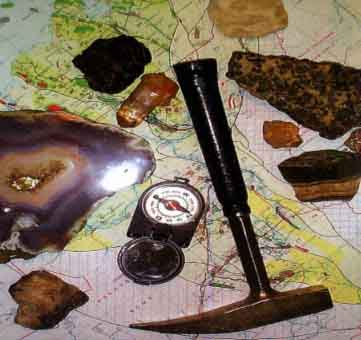 |
Facts
Duration: 1 semester
Period: Spring Semester
Credits: 3 ECTS
Hours: 108
|
Intro
The subject "History and Methodology of Geological Sciences" is a component of the base (general-professional) part of the professional cycle M.2 curriculum masters’ training towards training direction Geology. This course builds on the student’s previously passed all geological disciplines, especially the common and historical geology, mineralogy, petrology, regional geology. This course is the final in preparing undergraduates; it refracts in the historical aspect all received prior knowledge and equips students by methods of geological researches.
Main Objectives
The aim of the familiarization of subject "History and Methodology of Geological Sciences" is the ascertaining the general laws of the development of science and geology in particular. The course material generalizes all previous geological disciplines, giving students an idea about the main stages development of geological sciences in general and methodological basis of the major problems of modern geological theory and practice. As a result, a university graduate (Master) eye-out to be better prepared for independent research, with the possibility of more clearly imagines the importance to develop specific problems in the general post-translational science and more clearly defined set of methods used to resolve this problem. Objectives of the course are to develop a general idea about the development of geological sciences and the methodology used in these studies.
Learning Outcomes
The Master on the training direction “Geology” studying the subject "History and Methodology of Geological Sciences" must obtain such competences:
а) general cultural competences (GCC):
- he is ready by himself to improve and develop their intellectual and cultural level (GCC-1);
- he is ready by himself to integrate knowledge and to form their own judgment in solving professional and social objectives (GCC-7);
b) professional competences (PC):
general scientific:
- he is able by himself to acquire, interpret, organize and use in professional work new knowledge and skills, to develop their innovative capacity (PC-1);
- he is able to broaden and deepen their scientific outlook (PC-2);
As a result of the development of the discipline the student must:
Know:
- history of science as a change of conceptual frameworks;
- basic views and research directions of the largest representatives of the geological sciences.
Can:
- be able to form an idea of the different approaches to solving urgent problems of geology;
- to apply knowledge of the nature of scientific research, methodological research techniques in solving specific geological problems;
- to analyze theoretical and empirical possibilities participants contemporary geo-logical studies in the formation of multi-dimensional models of natural processes.
Master:
- the patterns of accumulation of knowledge, especially scientific thinking at different historical stages of human development;
- the methodology of geological research.
Professor
Sergei A. RODYGIN – Candidate of geological and mineralogical sciences, associate professor of the Chair of Paleontology and Historical Geology
Structure and content of subject "History and Methodology of Geological Sciences"
The overall complexity of the subject is 3 ECTS, 108 hours.
Structure of teaching
|
No. |
Section of subject |
Semester |
Week of the Semester |
Kinds of study, including independent work of students and labor (hours) |
Forms ongoing monitoring of progress. Form intermediate certification |
|||
|
Lectures |
Seminars |
Independent work of students with a teacher |
Independent work of students |
|||||
|
1. |
Introduction. Subject and methods, sections and tasks of the course. Periodization principles of natural science. |
2 |
25-26 |
2 |
4 |
1 |
4 |
time attendance, consultations |
|
2. |
Empirical geological knowledge in anciently. Geological knowledge in antiquity. |
2 |
27-28 |
2 |
4 |
6 |
individual tasks |
|
|
3. |
Geological knowledge in the Middle Ages. Geological knowledge in the Renaissance. |
2 |
29-30 |
2 |
4 |
6 |
individual tasks |
|
|
4. |
The development of geology in Russia in XVIII century. Geological views and writings M.V. Lomonosov. The struggle of ideas in geology in the late XVIII - early XIX century. |
2 |
31-32 |
2 |
4 |
6 |
individual tasks, intermediate testing |
|
|
5. |
Incipience of geological disciplines in the XIX century. First Geological Congress. Geological Committee. Geology in the twentieth century, Geology of the USSR. The current stage of development of geology. Geological education in Tomsk and Siberia. |
2 |
33-34 |
2 |
4 |
6 |
individual tasks |
|
|
6. |
Subject and object of research in geology. Forms of motion of substance. Basic laws of development of the Earth and the Earth's crust. Methods of Geological Sciences. Hypotheses and theories in geology. Prospects for the development of the geological theory. |
2 |
35-36 |
2 |
4 |
1 |
6 |
Colloquium, consultations |
|
Preparing for the exam |
36 |
Exam |
||||||
|
TOTAL |
108 |
12 |
24 |
2 |
70 |
|||
Educational technologies
Along with the classical teaching techniques (lectures, seminars and self-study students) in the process of teaching the course the other methods are apply including:
- lectures using multimedia tools that facilitate the understanding of the topic or issue. On time the reading a course of lectures presentations and interactive display are using;
- the mode of interview with the teacher realized through colloquia;
.png)